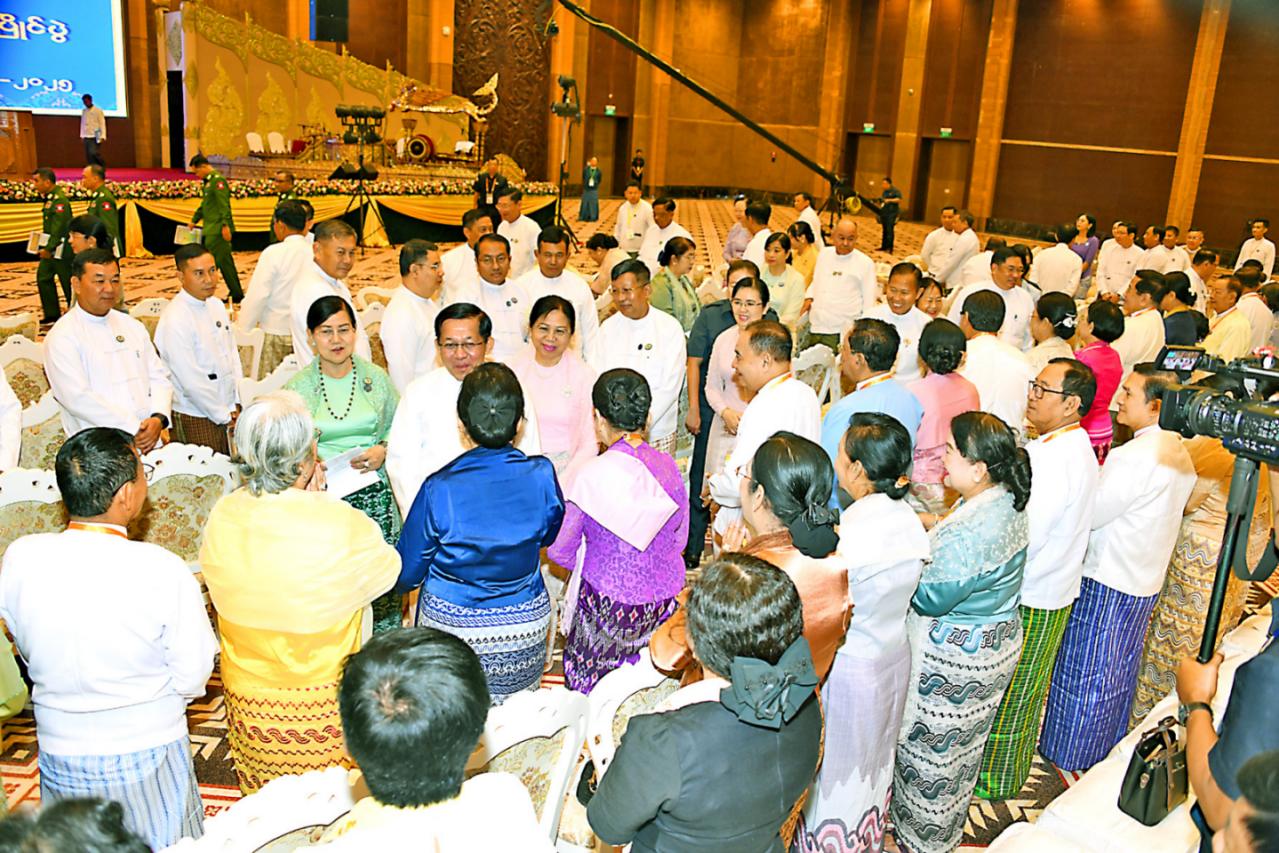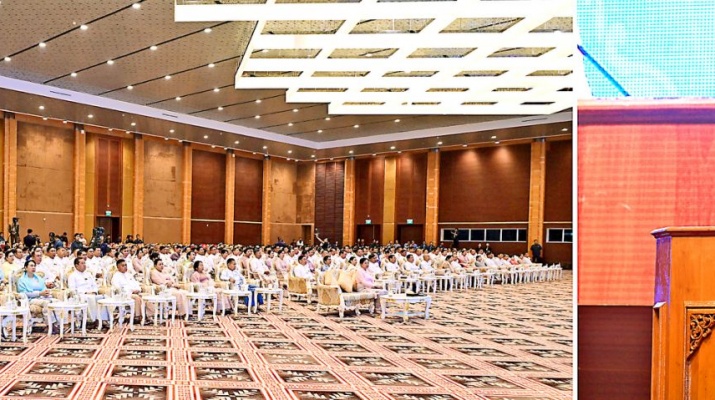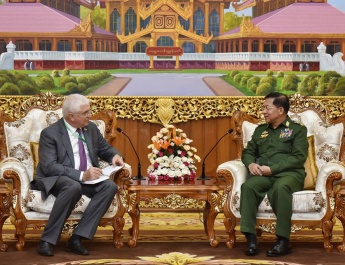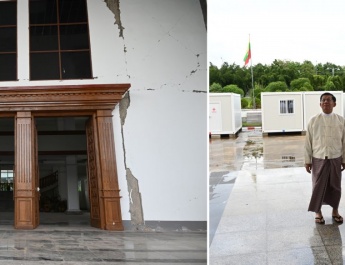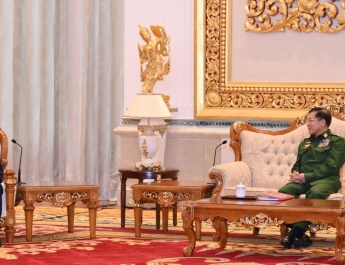Nay Pyi Taw October 7
The opening ceremony of the 26th Myanmar Traditional Cultural Performing Arts Competitions took place at Myanmar International Convention Center-I in Nay Pyi Taw this morning, with an address delivered by Acting President of the Republic of the Union of Myanmar, Chairman of State Security and Peace Commission of the Republic of the Union of Myanmar, Senior General Min Aung Hlaing.
Also present were Daw Kyu Kyu Hla, wife of the Senior General, SSPC Vice Chairman Vice-Senior General Soe Win and wife Daw Than Than Nwe, SSPC member Prime Minister U Nyo Saw and wife, SSPC Secretary Joint Executive Chief General Ye Win Oo and wife, SSPC members and wives, union level dignitaries, union ministers and wives, the Nay Pyi Taw Council chair, senior military officers from the Office of the Commander-in-Chief, the Nay Pyi Taw Command commander, deputy ministers, senior military officers from the Office of the Commander-in-Chief, members of the steering committee, work committee and subcommittees to hold the competitions, region/state ministers, judges, managers, coaches, supporters, national races contestants from regions and states and officials.
SSPC Vice Chairman Vice-Senior General Soe Win, Patron of the Steering Committee SS-PC member Prime Minister U Nyo Saw and Chair of the Steering Committee Union Minister for Religious Affairs and Culture U Tin Oo Lwin formally opened the ceremony.
Acting President of the Republic of the Union of Myanmar, Chairman of State Security and Peace Commission of the Republic of the Union of Myanmar, Senior General Min Aung Hlaing unveiled the signboard of the competitions by pushing a button.
The second part of the ceremony was opened with a song, “Aphyint-tay-kabya”, commemorating the 26th Myanmar Traditional Cultural Performing Arts Competitions.
In his keynote address, the Senior General said in this world, the national brethren of the country are able to stand with pride and uniqueness throughout the course of history, with their own literature, cultural traditions and customs, thanks to the innovations, efforts and honorable mores of the forefathers of the past successive periods.
The ability to preserve the level of their own cultural performing arts for a long time and to demonstrate them in accord with the ancient traditions is the main indicator in showing the prestige and standard of a country and its people. Myanmar has also preserved its age-old cultural performing arts till today, and can expose them in their original form, and this shows its high status and standard on the global stage.
The fact that Myanmar continues to possess its traditional cultural heritage to this day is due to the efforts of ancestors, who throughout Myanmar’s history discovered, preserved, promoted, and passed down these traditions. It is therefore the national duty and responsibility of the younger generations, as inheritors of this legacy, to continue preserving and promoting Myanmar’s unique cultural roots and values, following the noble customs of the past and ensuring that they do not fade away.
In the realm of Myanmar traditional culture, the arts of singing, dancing, writing, and playing musical instruments each possess their own unique qualities and distinct styles. At the same time, these disciplines—such as singing and dancing, dancing and instrumental music, instrumental music and singing, and singing and writing—are closely interrelated. They influence and support one another in mutual harmony, flourishing through their deep and balanced interconnection.
It is also hoped that the new generation of artists participating in the 26th Competition will be able to showcase their artistic talents in a way that brings satisfaction and enjoyment to the judges and audiences. Moreover, this grand competition is not only a contest but also an opportunity for the national brethren from across all states and regions to come together in friendship and harmony, to strengthen bonds of goodwill, and to exchange and share their diverse cultural and artistic traditions. Through these meaningful outcomes, it will also help promote greater unity and solidarity among the national races.
Therefore, in order to further strengthen and enhance the success and momentum of Myanmar’s traditional singing, dancing, writing, and instrumental music competitions, and to ensure that the 26th Competition now being held achieves its objectives successfully, it is earnestly urged that all responsible officials from relevant departments, maestros and distinguished artistes, judges, participating performers, and art enthusiasts work together with unity of purpose and collective effort.
It is urged that officials and artistes dedicate their talents and efforts to ensuring the continued vitality and development of the Myanmar people’s unique culture, arts, and ethnic identity. They are encouraged to cherish and preserve the authentic Myanmar traditional cultural arts, which have been cultivated magnificently over thousands of years, so that the pride and heritage of the Myanmar people remain alive and vibrant. They should also work to prevent the influence of alien cultures and help the younger generations grow with refined cultural sensibilities and a strong sense of national spirit and resilience. In line with these four objectives, it is earnestly requested that everyone involved strive for the successful organization of the 26th Competition and generously share the nation’s cultural heritage.
The Chairman of the Leading Committee Union Minister reported on arrangements for the competition.
After the ceremony, Acting President and SSPC Chairman of the Republic of the Union of Myanmar Senior General Min Aung Hlaing and his wife Daw Kyu Kyu Hla and party cordially greeted maestros.
The 26th Performing Arts Competition is being held in accord with its objectives: to explore, preserve, and enhance Myanmar’s national prestige, integrity, and distinctive cultural heritage; to promote and exemplify the spirit of national solidarity and unity through Myan-ma art; to transmit traditional performing arts to the younger generation; and to function as a national cultural and artistic institution contributing to the State’s socioeconomic development.
